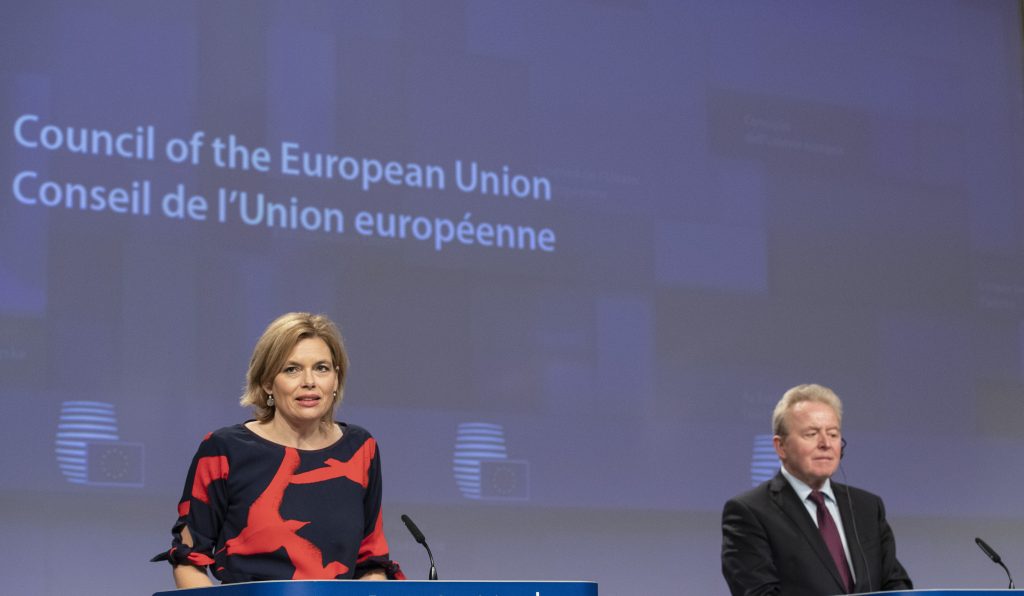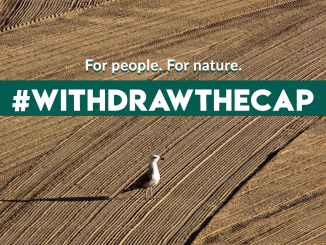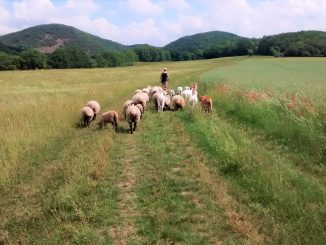
Updated 12.05Hrs on 28/08/2020
12 national coalitions, representing over 400 organisations from a wide range of interests, have come together to demand radical reform in the CAP. Releasing a co-signed letter to coincide with the informal AGRIFISH meeting Monday 31st August to Tuesday 1st September, the letter pulls no punches in calling out CAP.
The German Presidency, which ends on 31st December, has made it clear that it wants to conclude the CAP negotiations within the term of its presidency.
The Good Food Good Farming Coalition, and France’s Pour Une Autre Pac, are joined by coalitions from Germany, Spain, Italy, Austria Poland, Ireland, Luxembourg, Austria, the Netherlands, Slovakia and Belgian Wallonia have already signed up to the letter that prioritises a food sovereignty approach over business-as-usual in CAP.
Synergy with the EU Green Deal’s Farm to Fork and Biodiversity Strategies; more ambition for conditionality and other protections; a move away from blind per hectare payments towards public money for public services; a strengthened, results-focused new delivery model; and great transparency and inclusion are the specific demands.
Download the letter (ENG FR DE)
Joint Open Letter to the German Presidency of the European Union for the Reform of CAP
Lettre ouverte à la présidence allemande de l’Union européenne sur la réforme de la PAC
Offener Brief an die Deutsche EU Ratspräsidentschaft zur GAP Reform
Letter in Full
Dear Mrs. Julia Klöckner, representative of the German presidency of the AGRIFISH Council,
In four days, you will host an informal AGRIFISH Council in Koblenz, gathering agriculture ministers of all EU Member States, to discuss lessons from the COVID-19 pandemic, initiatives for animal welfare and the reform of the Common Agricultural Policy (CAP). Germany has the tough assignment of reaching an agreement on the CAP reform within the Council during its six-month presidency. Your responsibility is immense: CAP directly concerns all EU citizens, directing more than 30% of the next EU budget. CAP is also core to addressing our considerable ecological and social challenges.
The coronavirus pandemic has shown that the European Union must prioritise food sovereignty. This requires the EU to redefine the purpose of the CAP and trade agreements, which currently threaten food sovereignty in Europe and other regions. EU agri-food policy means: cheap and unsustainable imports and exports, in particular from and to developing countries (contributing to global warming by deforestation and land degradation); overspecialisation in production; limitless productivity goals and a dominant focus on competitiveness which fails to protect soil fertility and biodiversity, or the people who work in rural areas in Europe and other regions, including farmers. In short, CAP and current EU trade policy harms our ability to sustainably feed European communities.
The European Commission has set the direction for more sustainable development and climate neutrality to 2050 with the Green Deal, including the Farm to Fork and Biodiversity strategies. The Green Deal sets the course that the post-2020 CAP must follow – namely a major shift in our agri-food sector, including the whole food-chain. A continuation or an optimisation of the current system is not an option. Changes in the Common Agricultural Policy are necessary if we want to ensure the continuity of agricultural production in Europe, on which the food security of our generation and future generations depends. Furthermore, solutions to reform the CAP in the right direction are already known and widely shared by a wide-range of scientific experts – so we know why and how the next CAP must change.
Coalitions from twelve Member States – working closely with EU civil society umbrella coalitions and organizations, including farmer’s ones, and directly involved in the preparation of respective national CAP strategic plans – demand you lead the Council towards:
- A CAP reform that is compatible with the Green Deal, in particular with the targets of the Farm to Fork and Biodiversity strategies, while maintaining an EU-wide common approach. This means fundamentally changing the CAP’s outlook to ensure long term ability to produce food, by rebuilding functioning ecosystems, bringing agriculture in line with legal obligations under the Paris Agreement and boosting the shift to healthy diets.
- A much higher level of ambition as regards CAP conditionality, animal welfare, public health, sustainable water use, climate and environment protection, while improving farm viability, diversification, generational renewal and thereby the resilience in rural livelihoods.
- Replacing blind per hectare payments with the principle of “public money for public services” (including rural employment), shifting support to measures that enable farmers to invest in their agro-ecological transition, flanked by market-based mechanisms to improve economic viability, so that farmers can get a decent livelihood from their work as well as a greater weight in the value chain.
- Strengthening the so-called new delivery model, to ensure that the CAP budget will be used efficiently, by improving the result-based indicators as well as the CAP performance and monitoring checks and by setting common and ambitious ring-fencings of funds.
- Guarantees for effective transparency and stakeholder inclusion in the national processes for the preparation of strategic plans, as well as in the deliberations on national positions, negotiations between Member States and the Commission.
The CAP will lose any legitimacy in the eyes of EU taxpayers and consumers if the Council ignores these demands. In a few days, during the AGRIFISH informal Council in Koblenz, protestors will carry the voice of thousands of European citizens, to remind you of these demands. Our message is clear: the post-2020 CAP reform represents a major opportunity for the EU’s food and farming sector to transition into a sustainable system. We challenge the German presidency to bring the CAP reform in line with climate and biodiversity goals, and to end the decline in farm diversity and numbers. The path you are currently on is failing in all these areas, whereas you should use the ongoing negotiations to write a new page for our agriculture. Do not compromise our future! Act!
Signatories
- Agroecology in action (Belgium – Wallonia)
- AgroEko Forum (Slovakia)
- Aplinkosaugos koalicija (Lithuania)
- Cambiamo Agricoltura (Italy)
- Environmental Pillar (Ireland)
- Koalicja Żywa Ziemia (Poland)
- Meng Landwirtschaft (Luxemburg)
- Platform Aarde Boer Consument and Voedsel Anders the Netherlands (the Netherlands)
- Por otra PAC (Spain)
- Pour une autre PAC (France)
- Wir haben es satt!-Bündnis (Germany)
- Wir haben es satt!-Plattform (Austria)
c.c. Mr. Janusz Wojciechowski, Commissioner for Agriculture
Mrs. Stella Kyriakides, Commissioner for Health and Food Safety
Mr. Virginijus Sinkevičius, Commissioner for Environment, Oceans and Fisheries
Annex I. List of organisations that are members of the signatories coalitions
Agroecology in action (Belgium – Wallonia)
Collectif 5C, Associations 21, Autre Terre, Ceinture Aliment-Terre Liégeoise, CNCD – 11.11.11, Le Début des Haricots, Eclosio, L’Agroecology Lab de l’Université Libre de Bruxelles, Entraide et Fraternité, Faune et Biotopes, Fédération des Services Sociaux, FIAN Belgium, FUGEA, Greenpeace Belgium, Inter-Environnement Wallonie, Inter-Actions ASBL, Maison Verte et Bleue, Mouvement d’Action Paysanne, Mutualité Chrétienne, Natagora, Observatoire de la Santé du Hainaut, Oxfam Magasins du Monde, Oxfam Solidarité, Paysans-Artisans, Quinoa ASBL, Réseau des Consommateurs Responsables, Rencontre des Continents, Réseau des GASAP, Réseau Wallon de Lutte contre la Pauvreté, SAW-B, Solidaris, Terre-en-Vue, ULB-Coopération, Worms ASBL
AgroEko Forum (Slovakia)
Agrokruh, Alter Nativa o.z., Centrum environmentálnych aktivít, CEPTA – Centrum pre trvaloudržateľné alternatívy, Dych života n.o., Ekotrend Slovakia – Zväz ekologického poľnohospodárstva, FONTIS OZ, Greenpeace Slovensko, Mašekov mlyn, Ochrana dravcov na Slovensku, Oikos, PANGEA, Priatelia Zeme-CEPA, Slovenská ornitologická spoločnosť / BirdLife Slovensko, Sloboda zvierat, TATRY o.z., Zaježová o.z., Živá planéta o.z., Živica o.z.
Aplinkosaugos koalicija (Lithuania)
Aplinkosaugos informacijos centras, Gamtos apsaugos asociacija „Baltijos vilkas“, Lietuvos entomologų draugija, VšĮ „Žiedinė ekonomika“, Bendrija „Atgaja“, Všį „Darnaus vystymo iniciatyvos“
Cambiamo agricoltura (Italy)
Lipu, Legambiente, WWF, SlowFood Italia, Federbio, Aiab, Associazione Italiana Agricoltura Biodinamica, ISDE Medici per l’ambiente, Pro Natura, AIDA – Associazione Italiana di Agroecologia, CIWF Italia Onlus, ACU – ASSOCIAZIONE CONSUMATORI UTENTI, Rete Semi Rurali, Accademia Kronos
Environmental Pillar (Ireland)
An Taisce, Bat Conservation Ireland, BirdWatch Ireland, CELT (Centre for Environmental Living and Training), Coomhola Salmon Trust, Eco Advocacy, ECO-UNESCO, FEASTA, Forest Friends, Friends of the Earth, Global Action Plan Ireland, Gluaiseacht, Good Energies Alliance Ireland, Green Economy Foundation, Green Foundation Ireland, Hedge Laying Association of Ireland, Irish Peatland, Conservation Council, Irish Seed Savers Association, Irish Whale & Dolphin Group, Irish Wildlife Trust, Leave No Trace, Native Woodland Trust, The Organic Centre, The Rediscovery Centre Ireland, Sonairte, Sustainable Ireland Cooperative (Cultivate), Sustainable Projects Ireland (The Village), Vincent Wildlife Trust, VOICE, Wildlife Rehabilitation Ireland, Zero Waste Alliance
Koalicja Żywa Ziemia (Poland)
Forum Rolnictwa Ekologicznego im. Mieczysława Górnego, Fundacja Mała Wielka Zmiana, Fundacja Strefa Zieleni, Fundacja WWF Polska, Kooperatywa Spożywcza “Dobrze”, Nyeleni Polska, Polski Klub Ekologiczny, Stowarzyszenie Producentów Żywności Metodami Ekologicznymi EKOLAND – Oddział Lubelski, Stowarzyszenia Ekologiczno-Kulturalnego „Ziarno”, Greenpeace Polska, Koalicja Społeczna Stop Fermom Przemysłowym, Ogólnopolskie Towarzystwo Ochrony Ptaków, Fundacja Zielone Światło, Zielone Wiadomości, Instytut Spraw Obywatelskich, Ogólnopolskie Stowarzyszenie Agroleśnictwa, FoodRentgen, Slow Food Warszawa, Stowarzyszenie What a Waste
Meng Landwirtschaft (Luxemburg)
natur&ëmwelt, Bio-Lëtzebuerg – Vereenegung fir Bio-Landwirtschaft Lëtzebuerg, Greenpeace Luxemburg, Action Solidarité Tiers Monde, SOS Faim Luxembourg, Mouvement Écologique, Caritas Luxembourg, Aide à l’Enfance de l’Inde et du Népal, attac, CELL, Cercle de Coopération, Emweltberodung Lëtzebuerg, Église catholique à Luxembourg, etika, Fairtrade Letzebuerg, Frères des Hommes, Lëtzebuerger Landesverband fir Beienzuucht, Ligue CTF, SEED, Slow Food Luxembourg, VegInfo Luxembourg und Vegan Society Luxembourg
Platform Aarde Boer Consument and Voedsel Anders the Netherlands (the Netherlands)
Nederlandse Akkerbouw Vakbond (NAV), Nederlandse Melkveehouders Vakbond (NMV), Vereniging voor Biologisch Dynamische Landbouw, Vereniging tot Behoud van Boer en Milieu (VBBM), De Boerengroep, Women’s International League for Peace and Freedom (WILPF)
Por otra PAC (Spain)
Asociación Brinzal, Academia Española de Nutrición y Dietética, Asociación Galega de Custodia do Territorio, Asociación Mensa Cívica, Asociación Transhumancia y Naturaleza, Asociación Vida Sana, Centro de Estudios Rurales y de Agricultura Internacional, Confederación de Consumidores y Usuarios, Ecologistas en Acción, Ecovalia (Asociación Valor Ecológico CAAE), Federación Española de la Dehesa, Foro Asturias Sostenible, Foro de Redes y Entidades de Custodia del Territorio, Fundación Ecología y Desarrollo, Fundació Emys, Fundación Entretantos, Fundación Global Nature, Fundación Internacional para la Restauración de Ecosistemas, Fundación Nueva Cultura del Agua, Fundación Oso Pardo, Fundación Pau Costa, Fundación para la Conservación del Quebrantahuesos, Fundación Vida Sostenible, Ganaderas en Red, Germinando (Iniciativas Socioambientales GS Coop Mad), GOB Menorca (Grup Balear d’Ornitología), Greenpeace, Grupo de Rehabilitación de la Fauna Autóctona y su Hábitat, Justicia Alimentaria (Veterinarios Sin Fronteras), Madrid Agroecológico, Observatorio para una Cultura del Territorio, Plataforma de Ganadería Extensiva, Red de Ciudades por la Agroecología, Red Terrae (Asoc. Intermunicipal Territorios Reservas Agroecol.), Sociedad Española de Agricultura Ecológica, Sociedad Española de Ornitología, Trenca, WWF España, Xarxa de Custòdia del Territori
Pour autre PAC (France)
Afac-Agroforesteries, Confédération paysanne, Fédérations des associations pour le développement de l’emploi agricole et rural (FADEAR), Fédération nationale d’agriculture biologique (FNAB), Mouvement rural de jeunesse chrétienne (MRJC), RENETA (Réseau national des espaces-test agricoles), Réseau CIVAM (Centres d’Initiatives pour Valoriser l’Agriculture et Milieu rural), Terre de Liens, Terre et Humanisme, Union nationale de l’apiculture française (UNAF), Agir pour l’environnement, Compassion in world farming France (CIWF), Fédération des Conservatoires d’espaces naturels, Fédération des parcs naturels régionaux, Fondation Nicolas Hulot pour la Nature et l’Homme, France Nature Environnement, Générations futures, Greenpeace, Humanité et Biodiversité, Les Amis de la Terre, LPO, Réseau Action Climat, Welfarm, WWF, ActionAid France, Agter, ATTAC, Agronomes et Vétérinaires sans Frontières (AVSF), Comité français pour la solidarité internationale (CFSI), Coordination Sud, Ingénieurs sans Frontières — Agrista, Réseau Foi et Justice Afrique Europe, SOL – Alternatives Agroécologiques et Solidaires, Bio Consom’acteurs, Chrétiens dans le monde rural, Citoyens pour le climat, Commerce équitable France, Les Amis de la Confédération paysanne, Les Greniers d’Abondance, Miramap, RESOLIS, Secours Catholique, Slow Food, WWOOF France
Wir haben es satt!-Bündnis (Germany)
Arbeitsgemeinschaft bäuerliche Landwirtschaft e.V., junge Arbeitsgemeinschaft bäuerliche Landwirtschaft, Agrar Koordination und Forum für internationale Agrarpolitik e.V., Aktion 3.Welt Saar, Aktion Agrar – Landwende jetzt e.V., Aktion gegen den Hunger e. V., Arbeiterwohlfahrt international, Arbeitslosenselbsthilfe Oldenburg e. V., Attac Deutschland, Aurelia Stiftung, Bäuerliche Erzeugergemeinschaft Schwäbisch Hall, Biokreis e.V., Bioland-Verband für organisch-biologischen Landbau e.V., Bischöfliches Hilfswerk MISEREOR e. V., Brot für die Welt e.V., Bund für Umwelt und Naturschutz Deutschland e.V., BUND jugend, Bund Ökologische Lebensmittelwirtschaft, Bundesverband Berufsschäfer e.V., Bündnis für Gentechnikfreie Landwirtschaft, Bürgerinitiative Wietze für den Erhalt unseres Aller-Leine-Tals e. V., Campact e.V., Christliche Initiative Romero, Coordination gegen BAYER-Gefahren, Demeter e.V., Deutsche Umwelthilfe e.V., Deutscher Berufs- und Erwerbsimkerbund DBIB e.V., Deutscher Naturschutzring e.V., Deutscher Tierschutzbund e.V., Die Freien Bäcker, Ernährungsrat Berlin, FoodFirst Informations- und Aktions-Netzwerk Deutschland (FIAN), Foodsharing e.V., Fördergemeinschaft Ökologischer Landbau Berlin-Brandenburg (FÖL) e.V., Forschungs- und Dokumentationszentrum Chile- Südamerika e.V, Forum Umwelt und Entwicklung, Gen-ethisches Netzwerk e.V., Gentechnikfreie Regionen in Deutschland, Germanwatch e.V., Greenpeace e.V. , IG Nachbau, INKOTA-netzwerk e.V., Katholische Landjugendbewegung Deutschlands, Mellifera e. V., Vereinigung für wesensgemäße Bienenhaltung, Naturschutzbund Deutschland e.V., NaturFreunde Deutschlands e.V., Naturland-Verband für ökologischen Landbau e.V., Naturschutzjugend Deutschland e.V., NEULAND – Verein für tiergerechte und umweltschonende Nutztierhaltung, Oxfam Deutschland e.V., PROVIEH, Sarah Wiener Stiftung, Save Our Seeds, Slow Food Deutschland e.V., Slow Food Youth Deutschland, Solidarische Landwirtschaft e.V., Stadtbienen e.V., Umweltinstitut München e.V., VIER PFOTEN – Stiftung für Tierschutz, WWOOF-Deutschland: Freiwillige Helfer/innen auf ökologischen Höfen e.V., Zukunftsstiftung Landwirtschaft.
Wir haben es satt!-Plattform (Austria)
ÖBV-Via Campesina Austria, IG-Milch, FIAN Österreich, Südwind, Attac, Welthaus Diözese Graz-Seckau, GLOBAL 2000, Greenpeace, Grüne Bauern und Bäuerinnen, Arche Noah, Sezonieri – Kampagne für die Rechte der Erntehelfer_innen in Österreich
More on CAP
CAP & the Global South: National Strategic Plans – a Step Backwards?
CAP Strategic Plans on Climate, Environment – Ever Decreasing Circles
Climate and environmentally ambitious CAP Strategic Plans: Based on what exactly?
CAP | Billions Spent on Biodiversity with Little Impact – Auditors




